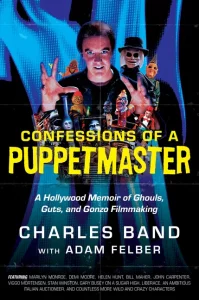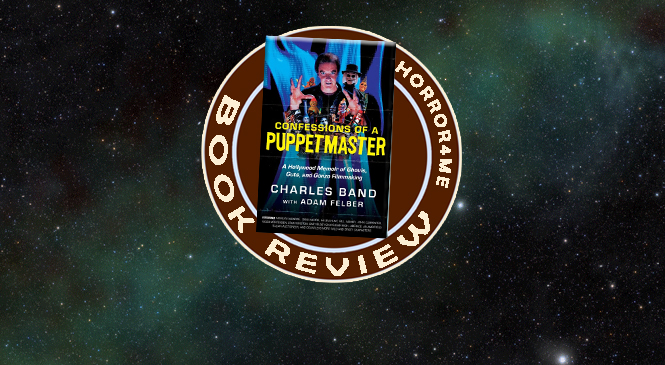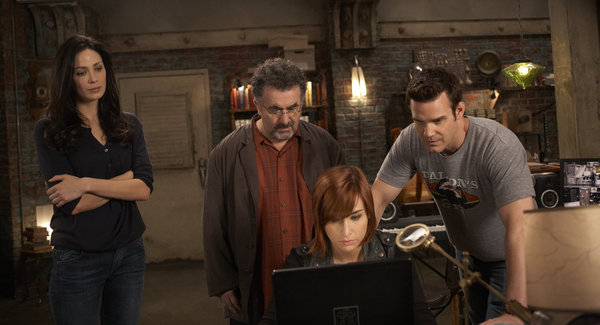Book Review: The CONFESSIONS OF A PUPPETMASTER Are Semi-Lurid

 Confessions of a Puppetmaster : A Hollywood Memoir of Ghouls, Guts, and Gonzo Filmmaking
Confessions of a Puppetmaster : A Hollywood Memoir of Ghouls, Guts, and Gonzo Filmmaking
Written by Charles Band with Adam Felber
Published by William Morrow (an imprint of Harper Collins Publishing)
November 16, 2021
275 pgs. Hardcover
You might not know his name, but if you’re a fan of horror, you’ve certainly seen one of his films even if you’re not aware of it. Charles Band has been producer or director, for over 360 films including Re-Animator, Ghoulies, Tourist Trap, and the Puppetmaster franchise to name a few.
Written in a conversational tone, Confessions of a Puppetmaster takes the reader on a wild multi-decade ride, with occasional behind the scenes detours, through the world of independent “exploitation” cinema. Now before you stop reading, let Band explain what exactly an “exploitation” movie is :
It takes whatever your thinking about right now, whatever’s in the wind, and recontextualizes it as entertainment. Quick, silly, down and dirty.
What’s being exploited is an opportunity, a cultural or historical moment. No actors or actresses are harmed in the making of these pictures.
The memoir begins with a great anecdotal example of Band tapping into the cultural zeitgeist of the neo-pandemic months of early 2020 to churn out Corona Zombies. Combining newly shot scenes of two Valley Girls trying to make sense of the impending nation-wide lockdown, with a redubbed and edited version of Italian schlock maestro Bruno Mattei’s Hell of the Living Dead, the six day wonder is rife with jokes about hand sanitizer, sheltering in-place and stockpiling toilet paper. Corona Zombies went on to earn Band the dubious honor of being the first filmmaker to create a feature with the pandemic as the main plot point. Six weeks later he would make the follow up Barbie and Kendra Save the Tiger King featuring the voice of Leslie Jordan (Will and Grace) again using recycled Italian footage, this time of crocodiles and cannibalistic natives to tell a story of kindergarten aged Joe Exotic.
We haven’t even gotten to the first chapter yet and Band, like a video age combination of P.T. Barnum and William Castle, has already set the stage for the three ring dark ride of a read. Composed of 13 chapters ranging from 1951 to fall of 2020, the book leads the reader on a frantic, yet enthralling, recollection of Band’s years as an entertainer, filmmaker and home video pioneer. One moment Band is telling you of his first film, the lost Last Tango in Paris parody Last Foxtrot in Burbank hiring a pre-Halloween John Carpenter to edit the film under the pseudonym John T. Casino. The next he’s comparing himself to Max and Leo from The Producers after spending $14,000 on red carpet, klieg lights, and an open bar for the Hollywood Premiere only to have 14 customers show up for the second showing, with even less attending the third. Band recalls an enthusiastic phone call from a friend reporting in about the crowd numbers for the fourth showing, expecting to be wowed by a full house, only to be told that there were only four ticketholders BUT, two of them were John Lennon and Yoko Ono! He was still ruined, but at least that was cool.
Band doesn’t consider Last Foxtrot to be his first real film when discussing his career. That honorific is bestowed upon Mansion of the Doomed, yet it is clear that he took some of the lessons learned from the making of the film.
The theme of optimistically moving forward, despite setbacks, and enjoying the act of creating is the heart and soul of Confessions. Readers will find mention of various celebrities and some details of Band’s private life, but those are interwoven into the backdrop of filmmaking, studio acquisitions, and even international relations, rather that for clout or salaciousness.
One of the many fascinating episodes in this book centers around becoming the first American filmmaker to shoot in a newly democratized Romania a mere nine months after a bloody revolution that toppled the reign of communist dictator Nikolai Ceausescu. With limited to no available electricity, food, film equipment and the frustrations of a language barrier on both ends, it was truly a feat that the Subspecies trilogy was completed at all, let alone that it turned out to be a really gruesomely fun love letter to both classic vampire and cliffhanger serial genres. Band makes it clear that none of that would have been possible without the contributions and camaraderie of the Romanian department heads and film crew. He cites several examples during production that move the narrative away from an American “fish out of water” experience to one of cultural discovery and mutually beneficial cooperation that set the stage for the resurgence of the Romanian film industry after so many years of creative repression and censorship.
It’s so refreshing to read a memoir that devotes a great many of its pages to the acknowledgement of others than the person on the cover in such and entertaining and fun manner.
Another laugh inducing moment is the story of buying an historic Italian castle, because of his friends knowledge of traditional Italian auction procedures involving the length of time from once a match is lit till it is consumed by flame. Castle Giove went on to be both the summer residence for the Band family and the setting for multiple Full Moon movies including Castle Freak, Skull Heads and Band’s twist on Beauty and the Beast film Meridian featuring Twin Peaks’ Sherilyn Fenn in her first leading role.
When Meridian needed a screen-worthy creature suit that would stand up to long hours of use on the set as a focal point, Band called his friend special effect artist Greg Cannon for help. Cannon came through in spades by repainting Gary Oldman’s iconic werewolf transformation suit, sending it to Band just days after Oldman had finished filming his scenes with it in the Francis Ford Coppola film Bram Stoker’s Dracula — unbeknownst to Coppola, of course. Meridian ended up on video stores shelves months before Bram Stoker’s Dracula hit theaters with the beast prominently featured on the box cover making it an unintentional spoiler to eagle eyed film fans.
We’ve barely scratched the surface of the stories included in Confessions’ meager 275 pages, some of which include: Dealing with Gary Busey on a sugar high while filming The GingerDeadMan, the proposed assassination of notoriously difficult actor Klaus Kinski, filming a fully clothed shower scene as part of a trailer to appease the YouTube algorithm and many many more.
Confessions of a Puppetmaster is an exuberant joy filled history of a filmmaker and his cohorts that never ceases to entertain leaving the reader wishing there were another 200 pages of wild and wacky B-movie greatness. Highly recommended.
![]()




